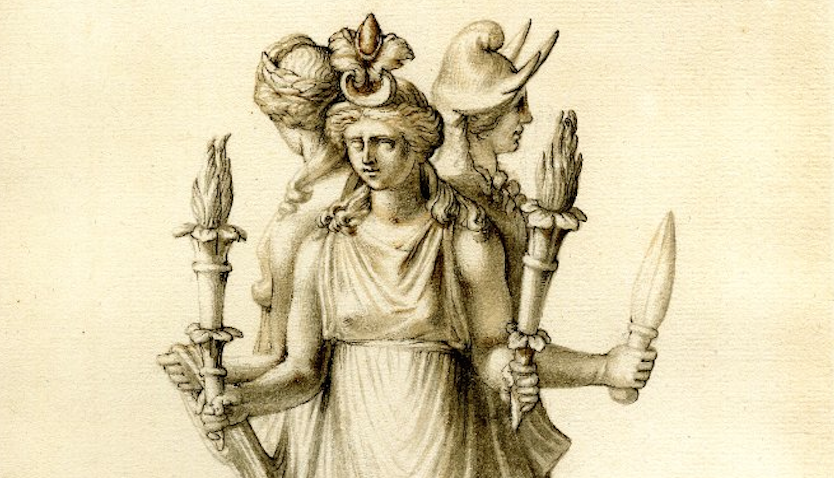
July 4, 2014, by Richard Rawles
Simaetha revisited (1)
How silly is it to use a parody or joke to flag up features on an ancient text? In my post Simaetha’s letter, I provided a letter to an agony aunt, as if written by Simaetha, the speaker of Theocritus 2.
This poem (a favourite of mine, which I teach as part of the first year module ‘Interpreting Ancient Literature’) is a dramatic monologue spoken by a young woman, Simaetha, who has been abandoned by her lover, Delphis. First we overhear her as she performs various magical rituals, some apparently intended to bring back her lover, and some to punish him. After she has sent away her maidservant, Thestylis, she gives the backstory, addressed to the Moon: she went to see a procession for Artemis (‘including a lioness’!), saw Delphis in the street and was overcome by desire for him until she sent Thestylis to take him a message, he visited her, and they made love. All seemed well, until he stopped visiting, and Simaetha heard gossip that he had fallen in love with somebody else (perhaps male, perhaps female: my ‘do you think he might be gay?’ doesn’t succeed in conveying the ancient assumption of male bisexuality). The poem ends with Simaetha’s renewed determination to use magic to compel Delphis to return or suffer, and a farewell to the moon.
In my parody, I fear I have patronised Simaetha too much – looking down on the past (John Bayley parodied this attitude in historical novels: ‘“Pass the Chian,” drawled Alcibiades’). However, this is a question provoked by the poem: how much does the poem invite us to look at Simaetha from a vantage point of greater knowingness and sophistication? This is partly to do with her handling of poetry from the past. She vividly describes her response to Delphis’ first arrival:
As soon as I saw him Stepping lightly across the threshold at my door… Learn, lady Moon, how my love came about. From head to foot I became colder than snow, And sweat like watery dew dripped from my brow. I couldn’t utter a sound, not so much as the whimper That babies make, calling in sleep to their mothers. My whole body went rigid, stiff as a doll’s.Here she shows her awareness of poetic tradition by recalling Sappho (fr.31.7-16, trans. Campbell):
For when I look at you for a moment, then it is no longer possible for me to speak; my tongue has snapped, at once a subtle fire has stolen beneath my flesh, I see nothing with my eyes, my ears hum, sweat pours from me, a trembling seizes me all over, I am greener than grass, and it seems to me that I am little short of dying.Is Simaetha’s adaptation clumsy, or charming, or both?
This way in which Simaetha tries to elevate and lend importance to her affair with Delphis by using poetic and mythical reminiscences seems to be an important part of how she expresses herself (hence ‘like in a song’ and ‘reminded me of all the poetry I ever read’ in my letter). Elsewhere one again wonders whether Simaetha is as good at using mythical and poetic traditions as she would like: she prays that, whether Delphis’ new lover is a man or a woman,
May he forget them utterly as once, on the island of Dia, Men say that Theseus forgot fair-haired Ariadne.Surely the smart way to use the myth of Theseus’ abandonment of Ariadne would have been for her to cast herself as Ariadne, so cruelly left behind by the faithless Theseus?
More broadly, we may feel that Simaetha has been foolish to trust the show-off Delphis, or to be surprised that this slippery character has betrayed her. Still, she knows this herself, and her powers of expression are certainly up to helping us to understand:
And I, poor gullible creature, Took his hand and pulled him down on to my soft bed. Quickly flesh grew warm against flesh, and our faces Became flushed with heat. We whispered sweet nothings. There is no need to prolong the tale, dear Moon: We went to the very end, and both fulfilled our desires.With hindsight, Simaetha knows that she has been made a fool of by desire, and we may come to pity her, to recognise the power of sexuality to provoke misplaced love and trust, and to feel sympathy for the way in which she uses her recollection of poetry – perhaps in rather the same way that she uses magic – as a way to try to process and cope with strong emotion.
At the end of the poem, Simaetha manages an impressive heightening of poetic dignity:
Farewell then, lady; turn your horses back to Ocean. I shall patiently bear my longing, as I have until now. Farewell, queen Moon with your shining throne, farewell You stars, you who attend the chariot of tranquil Night.Good night, ladies, good night, sweet ladies, good night, good night.
The translation quoted is by Anthony Verity, in the Oxford World’s Classics series.
Image: pen and ink drawing of a statue of Hecate, by Richard Cosway, in the British Museum. Public domain. https://commons.wikimedia.org/wiki/File:AN00969955_001_l.jpg

The translation I linked to above is a google books text with missing pages… Complete (but not very good) Loeb translation by JM Edmonds here: http://www.theoi.com/Text/TheocritusIdylls1.html#2